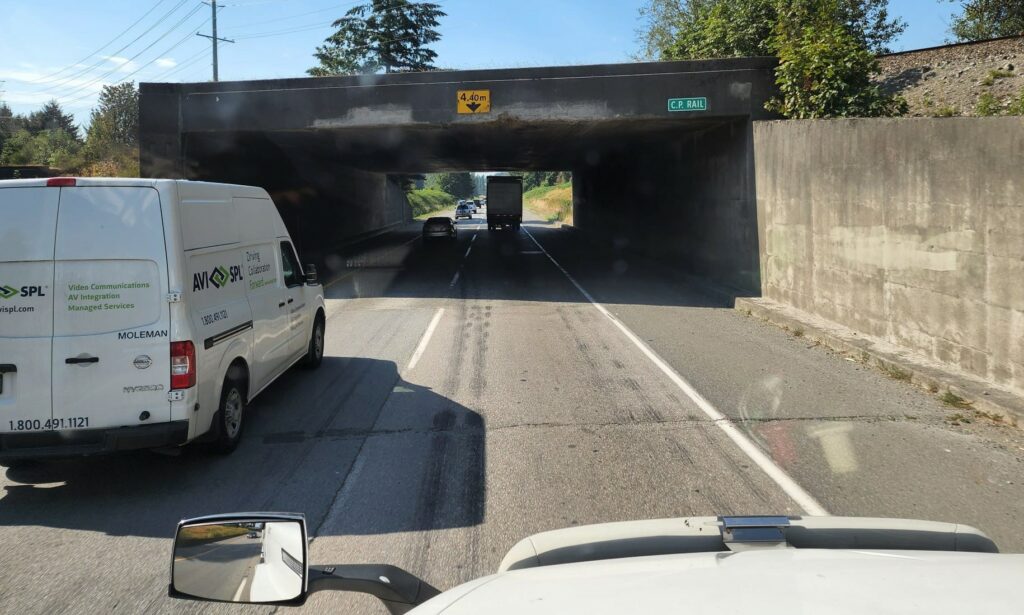B.C. cracks whip to prevent trucks hitting overpasses
British Columbia is taking tough action to prevent truck drivers from crashing into highway infrastructure.
Trucking companies involved in infrastructure crashes will see stronger consequences that escalate for repeat offences, according to a Ministry of Transportation and Infrastructure news release.

Specific amendments to the Commercial Transport Regulations and the Motor Vehicle Act Regulations bring in new offences and higher fines to address over-height vehicles and loads, as well as require dump-style vehicles to have in-cab warning devices by June 1, 2024. This will alert a driver if the dump box is raised when the vehicle is in motion.
Overheight vehicle fines increased
The overheight vehicle related fines will be $575 (previously $115), making this the highest fine of its nature in Canada. Not complying with having in-cab warning devices in dump trucks will result in a fine of $598.
In cases where a company has a history of non-compliance, including previous infrastructure crashes, enforcement measures will become increasingly severe. This includes potential suspension and possible cancellation of a company’s carrier safety certificate, essentially preventing their operation in B.C.
Longer suspensions
Unprecedented penalties have recently been imposed by suspending a company’s entire fleet, while Commercial Vehicle Safety and Enforcement investigates a crash. The immediate suspensions and the significant cost they bring to a company will be a permanent tool. However, repeat offenders will face longer suspensions and may have their certificate to operate in B.C. revoked.
“Infrastructure crashes have a huge impact. They delay commuters, affect the movement of goods and can impede first responders. This means families, businesses and the economy all suffer,” said Rob Fleming, minister of transportation and infrastructure. “Safety is the priority and this issue needs to stop. That’s why we’re taking tougher action, grounding fleets through suspensions and increasing fines, so highway traffic keeps moving safely and reliably for travelers and commercial vehicles, and people can count on their commute.”
Recent regulatory changes will also bring in new and higher fines for various offences.
Speed limiter regulations
Additionally, new speed limiter regulations will further improve safety by requiring heavy commercial vehicles operating in the province to have their speed-limiting systems activated and programmed by April 5, 2024, the province says.
The rule is intended to prevent these vehicles from traveling more than 105 km/h on B.C. highways. The fine for speed-limiter non-compliance and tampering is $295 and three driver penalty points.
BCTA welcomes measures
The B.C. Trucking Association welcomed the ministry’s decisions.
“The BCTA welcomes and supports the decisive measures taken by the provincial government to enhance safety and reduce infrastructure crashes involving commercial heavy-duty trucks,” said Dave Earle, BCTA president and CEO. “These initiatives mark a pivotal step toward creating safer roadways for all and underscore our shared commitment to fostering a culture focused on risk-prevention in the trucking industry.”
While B.C.’s new fines for infrastructure crashes will become the highest in Canada, fine amounts are currently limited by legislation. The province is reviewing potential legislative changes that would allow even higher fines in the future.
Have your say
This is a moderated forum. Comments will no longer be published unless they are accompanied by a first and last name and a verifiable email address. (Today's Trucking will not publish or share the email address.) Profane language and content deemed to be libelous, racist, or threatening in nature will not be published under any circumstances.
Just reading this article about trucks hitting the overpass in b.c.if this continues to be a problem.notifiy the carriers that run this particular stretch of road or post signs before the overpass saying big rigs cant clear.
Hi-60 years in the industry attending a mirage of committees and to this day literally “nothing ” has been accomplished. Commercial drivers with minimum skill are predominant today and the government just applies lip service as carnage on our highways is an everyday occurance.
It is said that operating a commercial motor vehicle on a public highway contrary to conditions of permit nullifies the permit.
It is also said that operating a commercial vehicle with an over-dimensional load without a valid permit renders your insurance invalid.
If the carriers damaging structures had to pay out of pocket to repair them, I dare say they might finally learn a valuable lesson. $575 is nothing, but a $2,000,000 repair bill might be the only formula to deal with repeat offenders. One other approach may be to only permit carriers which can post a bond – if you can’t secure a bond, you can’t get a permit.
The biggest problem in this industry remains to be the lack of substantial consequences for shoddy workmanship.
Maybe I’ve had my head in the sand for the last couple months or more. BC, forcing a speed limit on all carriers does not solve the problem of large trucks, driving recklessly, or the drivers being in a tent. The number of collisions and overhead damage structures has to do with poor training, poor compliance, and poor decisions. Speed limit do not solve any of these problems.
Road management comes with responsible operators ,pay, mentoring and training. Responsible drivers make intelligent choices –
Here is my suggestion- install signage
“ This transport is equipped with a speed control device….. a professional driver”